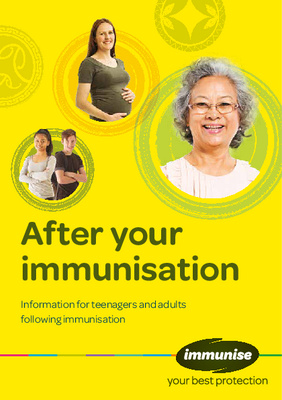After your immunisation - HE2505

Information for teenagers and adults about what may happen after they are immunised, and what they can do to help with any symptoms.
The full resource:
How you may feel after the immunisation and what can help
Serious immunisation reactions are very rare. Some people can get reactions that are the body's normal response to immunisation. These usually go away after a day or two, and are set out in the table below.
| What you may feel | What can help | When this could start |
|---|---|---|
|
Swelling and pain at the injection site (hard and sore to touch) Heavy arm |
Place a cold, wet cloth, or ice pack where the injection was given. Leave it on for a short time Do not rub the injection site |
Within 6–24 hours |
|
Feeling unwell or tired A fever or aching muscles* |
Rest and drink plenty of fluids Because paracetamol or ibuprofen can interfere with your immunse response to a vaccine, only take them for relief of significant discomfort or high fever. Follow the manufacturer's instructions, or seek advice from your health professional |
Within 6–24 hours |
| MMR vaccine only – a rash and fever (very rare) | No treatment is required. The rash is not infectious. | Between 5 and 12 days after immunisation |
* These symptoms may not be related to the vaccine, and could be signs of an unrelated illness. Seek medical advice if you are concerned.
If you have any concerns, talk to your family doctor or practice nurse, or call Healthline on 0800 611 116.
It is important to report any unexpected symptoms after immunisation to your family doctor or the practice nurse. If you are unsure about whether a symptom might be related to a vaccine, discuss this with your family doctor or the practice nurse.
Health professionals should report unexpected reactions to the Centre for Adverse Reactions Monitoring (CARM). You can also report them by emailing CARM or using the online reporting form on the CARM website otago.ac.nz/carm
Code: HE2505.